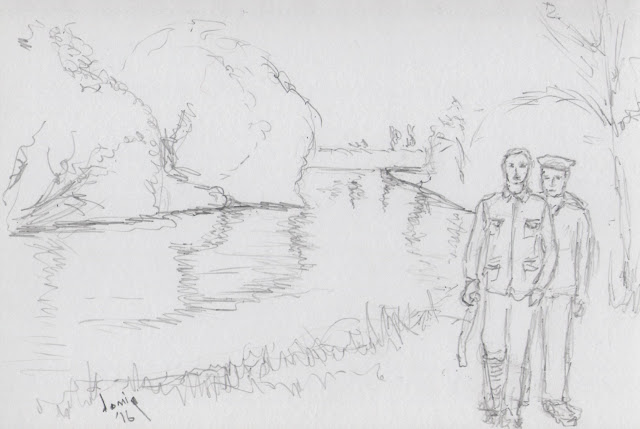i
In Dorset’s Ancient
County sat Wimborne,
A market town
where smugglers and kings
And age-old
legends made history - a place
New war had left
untouched, where the Stour
River passed through
in silence - its waters
Attracting
walkers and fishermen - in August's
Sun, Mr Street sat
himself down to catch fish.
The day’s hour
passed quietly, to provide
No sign of the gruesome
discovery Mr Street
Was soon to make -
Feeling a pull on his rod
Mr Street reacted,
to gently tug on the catch.
Yet a resistance
came, prompting him to pull
Harder - a
strange weight resisted him, then
With another tug,
surfaced submerged bodies.
Street had made
discovery of two drowned
Soldiers bound
together - idetification found
One man of a Royal
Naval division, the other
A soldier of a
Lancaster Regiment - a letter
And photo on the latter provided
his name -
Why and how had
these two men drowned?
Found far away from
regiments and homes.
Puttees had been tied
about their wrists in
Death's embrace -
had they willingly met
An end together, or an act of murder that
had gone wrong? The letter in the pocket,
had gone wrong? The letter in the pocket,
Un-posted,
contained a photograph of him
Addressed to the family's home; puzzles
Answered in part
contained by his words.
ii
Taking up a pen
in a nervous hand, Private
James Wood aged
21 began to put down
His thoughts -
perhaps by letter's end they
Might change his
intentions - Woods hoped
His father Joseph
and mother Mary Ann
Might then understand
his desperation -
James considered
what had led him there.
Their son Albert,
his brother, had been
Killed and his
own wound had plagued him,
For a month James
had not slept - so why
Then was the
other man he died with there?
What reasons,
connections might they have
Had in traveling
to Wimborne in Dorset, in
Whatever purpose
other than to drown?
A clue to the
other man was a RND cap
Ribbon pushed
into his pocket - identity
Could not be
certain, though it seemed
He might be a
Private Parker - also
To be from
Manchester - very likely
To have been a
declared deserter,
Perhaps
supporting Pt. James Wood.
Did then Parker
RND sit and wait
As Pt. Wood 17060
finished his letter,
To ask his family
for their forgiveness.
Was this some
absurd murder plot?
The two took a
walk down to the river
Stour, maybe avoiding any witness,
Stour, maybe avoiding any witness,
To stop and bind
their wrists together.
The deserter Able
Seaman Parker
Stood with Private
Wood who decided
That he could go
on no longer - what
Words would have
been said between
Them? Unrolling
Wood's khaki puttee
They carefully secured themselves
Together, in
shared desperation to die.
iii
Time then passed their bodies pulled
Out the Stour by a
fisherman - to make
Another mystery
for Wimborne history.
The coroner declared their act of suicide
The coroner declared their act of suicide
Happened while in
an unsound mind -
To leave a dispute, regarding identifying
the name of the drowned able seaman.
James Mason or James Lennon? the
Latter deserting 3 August 1916.To believe
This was the most likely man, his parents
Informed he had drowned; then Lennon
Returned to camp on 1 September 1916.
An unsolvable mystery was left,as to why
Informed he had drowned; then Lennon
Returned to camp on 1 September 1916.
An unsolvable mystery was left,as to why
They chose to drown together; as brothers
Effected by shell shock? Or by strange pact?
By Jamie Mann.
Anon.,1916.
Battlefield Souvenirs - Boche Fire At Wounded. The Daily Telegraph,
[online] 25 August 1916.
P.5. Col.2. Available at:
<http://www.telegraph.co.uk/news/ww1-archive/12212859/Daily-Telegraph-August-25-1916.html>
[Accessed: 22 August 2016].
Mann, J., 2016. 100 years Ago - Poems by Jamie Mann. [letter] (Personal
communication, 22 August 2016).
#WW1 #WW1centenary #GreatWar #WW1poem #GreatWar #WW1centenary
#worldwarone #worldwaroneremembered #WW1Dorset




